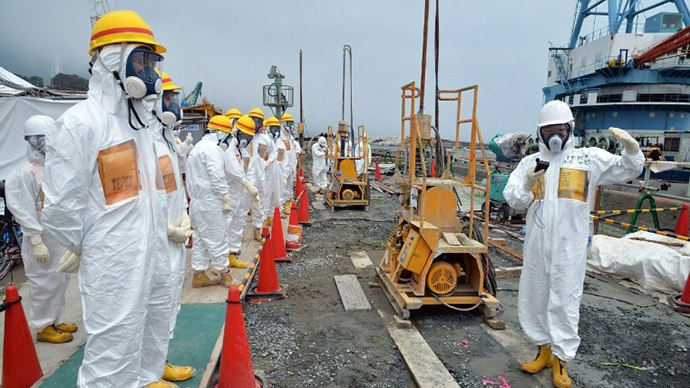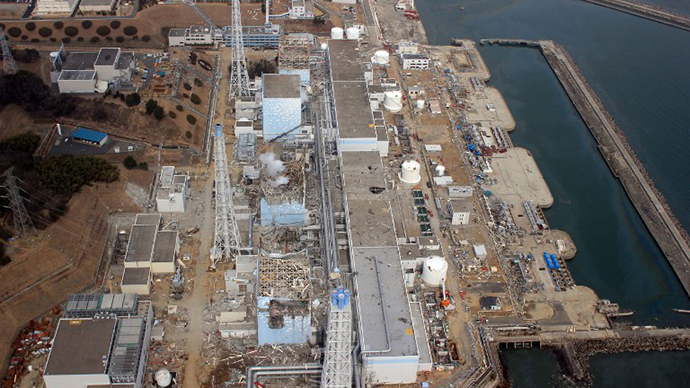Water leaks at Fukushima could contaminate entire Pacific Ocean

Two and a half years after the Fukashima tragedy Japan does not want to admit how serious it is, but it is obvious the drastic environmental implications are to follow, Harvey Wasserman, journalist and advocate for renewable energy, told RT.
RT:Japanese officials have admitted a leak at Fukushima has been happening for two years and is worse than earlier thought. Why did it take so long to evaluate the actual repercussions of the tragedy and take decisive measures to tackle them?
HW: The Japanese authorities have been covering up the true depth of the disaster because they don’t want to embarrass themselves and the global nuclear industry and they are trying to open up another nuclear plant in Japan. When the Japanese people now find out that the accident is worse than we thought and they have been leaking many tons of radioactive water into the Pacific Ocean for almost two and a half years, this is a catastrophe. Tokyo Electric has no idea how to control this accident. This is absolutely terrifying after two and a half years. To find out that these reactors have been out of control, now that they can’t control this they don’t know what’s going on. This is not a primitive backward country; this is Japan with advanced technology. It has very serious implications for nuclear power all over the world.
RT:Why the plant's operator failed to contain the leak?
HW: Because they don’t know what to do. This has never
happened before. You have three explosions; you have four nuclear
reactors that are severely compromised. No one ever planned for
this. This is an apocalyptic event. This is something that could
contaminate the entire Pacific Ocean. It is extremely serious.
The reality is that Tokyo Electric does not know what is
happening and does not know how to control what is going on. Our
entire planet is at risk here. This is two and a half years after
these explosions and they are still in the dark. It’s terrifying.
Prof. Christopher Busby, to the contrary, believes that "the Pacific Ocean is big enough for this level of release not to represent the global catastrophe that some are predicting" and provides his calculations in his article on RT.com.
RT:An estimated 300 tonnes of contaminated water is spilling daily into the ocean. How come Tepco insists the leaks still pose no big threat to the environment?
HW: They are lying; they can’t face the reality of this
situation. When have very serious quantities of radiation going
into the Pacific Ocean. There is no medical or epidemiological or
scientific basis for estimating how much damage this will cost.
We are on entirely new ground here and this cannot go by without
a serious impact on the entire human race. This is a terrible
tragedy.

RT:The clean-up was previously on Tepco alone. Why didn't the government step in earlier? Rectifying an accident like the one at Fukushima needs a comprehensive approach, doesn't it?
HW: The problem is that the company does not want to admit how serious this is and the government of Japan doesn’t want to admit how serious this is. And even if the government of Japan steps in, they don’t know what to do. This particular administration in Japan wants to open the other nuclear plants. 50 nuclear plants have been shut in Japan since the accident and they want to reopen them. This is very political, because if they admit to how bad the things are in Fukushima the public is not going to stand for them re opening other nuclear plants, including some that are owned by Tokyo Electric Power. How do you have a huge utility company on one hand saying that we can’t control all these 300 tons of radioactive liquid going into the Pacific Ocean every day, and on the other hand we want you to let us open these other nuclear reactors? This is a catastrophe for them and that’s why they have been lying about it because they want to open other nuclear plants but they don’t want the public to know how serious the damage is in Fukushima.
RT:According to some estimates it will take 40 years to clean-up the contaminated area. Why so long?
HW: That is not long enough. It will never be cleaned up. We have materials there that are radioactive, that are harmful, and that are dangerous for hundreds of thousands of years. They can talk about cleaning it up in 40 years but it will never be cleaned up. You will never be able to go back on that site. The radioactivity will be in the waters forever.
RT:What long-term impact of the radiation leak on Japan and its neighbouring countries we should expect in the future?
HW: There are serious health impacts. People will be harmed. We are seeing 40% rate of thyroid damage among children in the area and this is a huge impact and it will go up, not down. More and more radiation is escaping from the water and tritium into the atmosphere. And radiation to the thyroid is very serious, especially among small children and we are already seeing a 40% rate. People will be suffering for hundreds of years. I interviewed people in central Pennsylvania a year after the accident and discovered tremendous health impacts among the people there. We know that Chernobyl did tremendous damage to people in Belarus and Ukraine and now we are going to see it again in Fukushima.
The statements, views and opinions expressed in this column are solely those of the author and do not necessarily represent those of RT.












